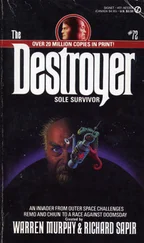A reporter and columnist on the business desk, Shavers was as pompous and as awkward at small talk as he thought he was charming; however, he was benign in his self-delusion and touching in his mistaken conviction that he was a spellbinding raconteur. He said without preamble, ‘Joseph, dear boy, opened a case of ‘74 Mondavi Cabernet last week, one of twenty I bought as an investment when it was first released, even though at the time I was in Napa not to scout the vintners but to shop for an antique clock, and let me tell you, this wine has matured so well that—’ He broke off, realizing that Joe had not worked at the newspaper for the better part of a year. Fumblingly, he tried to offer his condolences regarding ‘that terrible thing, that awful thing, all those poor people, your wife and the children.’
Aware that Randy Colway’s telephone was ringing again farther back in the newsroom, Joe interrupted Shavers, intending to brush him off, but then he said, ‘Listen, Dan, do you know a company called Teknologik?’
‘Do I know them?’ Shavers wiggled his eyebrows. ‘Very amusing, Joseph.’
‘You do know them? What’s the story, Dan? Are they a pretty large conglomerate? I mean, are they powerful?’
‘Oh, very profitable, Joseph, absolutely uncanny at recognizing cutting edge technology in start-up companies and then acquiring them — or backing entrepreneurs who need cash to develop their ideas. Generally medically related technology but not always. Their top executives are infamous self-aggrandisers, think of themselves as some kind of business royalty, but they are no better than us. They, too, answer to He Who Must Be Obeyed.’
Confused, Joe said, ‘He Who Must Be Obeyed?’
As do we all, as do we all,’ said Shaver, smiling and nodding, raising his pipe to bite the stem.
Colway’s phone stopped ringing. The silence made Joe more nervous than the insistent trilling tone had done.
They knew where he was.
‘Got to go,’ he said, walking away as Shavers began to tell him about the advantages of owning Teknologik corporate bonds.
He proceeded directly to the nearest men’s room. Fortunately, no one else was in the lavatory, no old acquaintances to delay him.
In one of the stalls, Joe tore Rose’s message into small pieces. He flushed it down the toilet, as Demi had requested, waiting to confirm that every scrap vanished, flushing a second time to be sure that nothing was caught in the drain.
Medsped. Teknologik. Corporations conducting what appeared to be a police operation. Their long reach, from Los Angeles to Manassas, and their unnerving omniscience, argued that these were corporations with powerful connections beyond the business world, perhaps to the military.
Nevertheless, regardless of the stakes, it made no sense for a corporation to protect its interests with hitmen brazen enough to shoot at people in public places — or anywhere else, for that matter. Regardless of how profitable Teknologik might be, big black numbers at the bottom of the balance sheet did not exempt corporate officers and executives from the law, not even here in Los Angeles, where the lack of money was known to be the root of all evil.
Considering the impunity with which they seemed to think they could use guns, the men that he had encountered must be military personnel or federal agents. Joe had too little information to allow him even to conjecture what role Medsped and Teknologik played in the operation.
All the way along the third-floor hall to the elevators, he expected someone to call his name and order him to stop. Perhaps one of the men in the Hawaiian shirts. Or Wallace Blick. Or a police officer.
If the people seeking Rose Tucker were federal agents, they would be able to obtain help from local police. For the time being, Joe would have to regard every man in uniform as a potential enemy.
As the elevator doors opened, he tensed, half expecting to be apprehended here in the alcove. The cab was empty.
On the way down to the first floor, he waited for the power to be cut off. When the doors opened on the lower alcove, he was surprised to find it deserted.
In all his life, he had never previously been in the grip of paranoia such as this. He was overreacting to the events of the early afternoon and to what he had learned since arriving at the offices of the Post.
He wondered if his exaggerated reactions — spells of extreme rage, spiralling fear — were a response to the past year of emotional deprivation. He had allowed himself to feel nothing whatsoever but grief, self-pity, and the terrible hollowness of incomprehensible loss. In fact, he’d striven hard not to feel even that much. He had tried to shed his pain, to rise from the ashes like a drab phoenix with no hope except the cold peace of indifference. Now that events forced him to open himself to the world again, he was swamped by emotion as a novice surfer was overwhelmed by each cresting wave.
In the reception lounge, as Joe entered, Dewey Beemis was on the telephone. He was listening so intently that his usually smooth dark face was furrowed. He murmured, ‘Yes, uh-huh, uh-huh, yes.’
Heading toward the outer door, Joe waved good-bye.
Dewey said, ‘Joe, wait, wait a second.’
Joe stopped and turned.
Though Dewey was listening to the caller again, his eyes were on Joe.
To indicate that he was in a hurry, Joe tapped one finger against his wristwatch.
Hold on,’ Dewey said into the phone, and then to Joe, he said, a man here calling about you.’
Joe shook his head adamantly.
‘Wants to talk to you,’ Dewey said.
Joe started toward the door again.
‘Wait, Joe, man says he’s FBI.’
At the door, Joe hesitated and looked back at Dewey. The FBI couldn’t be associated with the men in the Hawaiian shirts, not with men who shot at innocent people without bothering to ask questions, not with men like Wallace Blick. Could they? Wasn’t he letting his fear run away with him again, succumbing to paranoia? He might get answers and protection from the FBI.
Of course, the man on the phone could be lying. He might not be with the Bureau. Possibly he was hoping to delay Joe until Blick and his friends — or others aligned with them — could get here.
With a shake of his head, Joe turned away from Dewey. He pushed through the door and into the August heat.
Behind him, Dewey said, ‘Joe?’
Joe walked toward his car. He resisted the urge to break into a run.
At the far end of the parking lot, by the open gate, the young attendant with the shaved head and the gold nose ring was watching. In this city where sometimes money mattered more than fidelity or honour or merit, style mattered more than money; fashions came and went even more frequently than principles and convictions, leaving only the unchanging signal colours of youth gangs as a sartorial tradition. This kid’s look, punk-grungeneopunk-whatever, was already as dated as spats, making him look less threatening than he thought and more pathetic than he would ever be able to comprehend. Yet under these circumstances, his interest in Joe seemed ominous.
Even at low volume, the hard beat of rap music thumped through the blistering air.
The interior of the Honda was hot but not intolerable. The side window, shattered by a bullet at the cemetery, provided just enough ventilation to prevent suffocation.
The attendant had probably noticed the broken-out window when Joe had driven in. Maybe he’d been thinking about it.
What does it matter if he has been thinking? It’s only a broken Window.
He was certain the engine wouldn’t start, but it did.
As Joe backed out of the parking slot, Dewey Beemis opened the reception-lounge door and stepped outside onto the small concrete stoop under the awning that bore the logo of the Post. The big man looked not alarmed but puzzled.
Читать дальше












